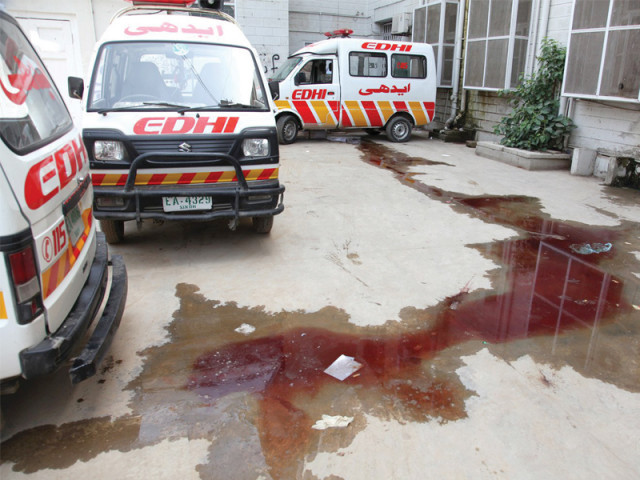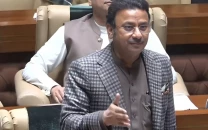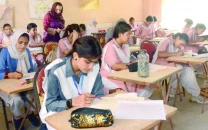The twisted pride of a Karachiite
2011 had its share of morbid excitement.

Zulfiqar Mirza’s strangeness truly manifested itself later in the year, but that doesn’t mean the first half of 2011 was lacking in morbid excitement. The first signs that this was going to be a difficult year came when Salmaan Taseer was killed. His murder may have taken place in Islamabad, but the innocent bystanders that got hurt in the shooting stood in Karachi as well. MNA Sherry Rehman had to go into hiding for her own stand against the misuse of the blasphemy law. Death threats and protests began throughout the city, most in favour of Mumtaz Qadri. When, one month later, the 2nd Karachi Literature Festival began, it was still a focus of discussion.
By May the real violence began, when on the 22nd, PNS Mehran was attacked by a group of militants with exceptional preparedness. In the 17 hours it took to clear the base, unfortunately not before the two surveillance aircraft were destroyed and 10 people killed, Karachiites were treated to the surreal experience of going about their lives while a major military installation in the heart of the city was under siege. Business never stops in Karachi. Life goes on strangely.
Life, unfortunately, did end rather violently and sadistically for Sarfaraz Shah, a civilian shot by Rangers. The murder was caught on film and the resultant outrage was more than anyone could have predicted. Karachiites, exhausted by the repeated indignities they had suffered at the hands of authority figures, forced the issue into the courts.
Another issue that the courts had to involve themselves with, albeit grudgingly, was the surge in target killings in the city. Violence of a level not seen since the 1990s once again returned to the streets as each political party took it upon itself to wage war on the civilian populace. Innocents died for their ethnic background alone. It did not matter to these self-appointed racists that in the end they were not killing Pashtuns, Mohajirs or even Sindhis. They were killing Karachiites. They were killing their own. By July of 2011, 1,138 Karachiites had died. Not in massive bomb blasts that killed most of them at once, but one at a time. Each bullet individually shot, each life individually taken.
When the chief justice did finally deign to descend from on high, his highly anticipated judgment announced, in much legalese, that indeed people were dying and it was really quite a bad thing. Then he left.
In a highly charged atmosphere like Karachi’s, it is important to pick your words carefully and to avoid offence. Zulfiqar Mirza decided to do exactly the opposite of that. On July 13, deciding things just weren’t tense enough, he launched into a rant directed against Urdu-speaking people in Sindh. The protests that the MQM organized the next day were typical of all MQM protests in that they were peaceful and calm. Once you ignored all the shooting and killing. A forced apology followed before Zulfiqar Mirza once again decided to let loose with his opinions. On August 28, with a Quran on his head, he began detailing the MQM’s role in violence in Karachi and involvement in target killings. It took the MQM close to two weeks to provide their rebuttal, delivered on September 9 in the form of a surrealistic performance art exhibition by Altaf Husain that left even his biggest critics in stunned silence.
As if to remind us that local politics isn’t the only thing that can kill us, al Qaeda jumped back into the fray when 10 days later it attacked SSP Chaudhary Aslam Khan’s house in Phase 8 of DHA. The bomb blast destroyed his home and killed 7 of his security guards and a schoolteacher and her son. Many more would have died had it occurred any closer to the school nearby. In tragedies we are sometimes left looking for blessings.
If there is anything to be grateful for, it is that since then Karachi has been relatively silent. Sure the daily rhythm of car thefts, kidnappings and cell phone robberies continues, but that has just become the monotonous bass beat that we barely register anymore. The sense of security has increased so much so that when the PTI finally held its rally on December 25, over a 100,000 turned up to cheer. It was probably the largest gathering at the Quaid’s Mazar in years and it went off without any tragedy (not counting Salman Ahmed’s karaoke).
What we mustn’t forget in this chaotic mix is the Karachiite. That strange creature that has so insulated itself against the tensions inherent in living in such an extreme environment, that it begins to carry itself with a twisted sense of pride. To go for a job, step out with the family, visit Port Grand or drive down to Hardees, despite the constant violent interruptions, takes a kind of resilience that not many cities can manage. Still, it would be nice to not have it tested so often.
Published in The Express Tribune, December 31st, 2011.



















COMMENTS
Comments are moderated and generally will be posted if they are on-topic and not abusive.
For more information, please see our Comments FAQ